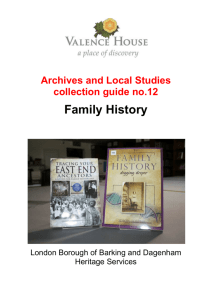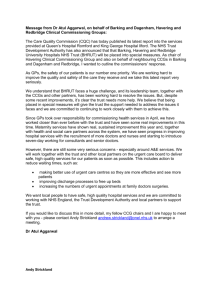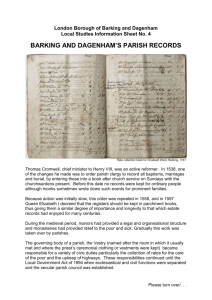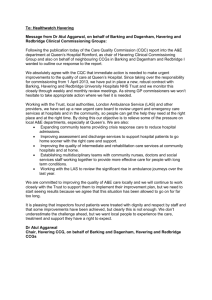Serious Case Review Presentations
advertisement
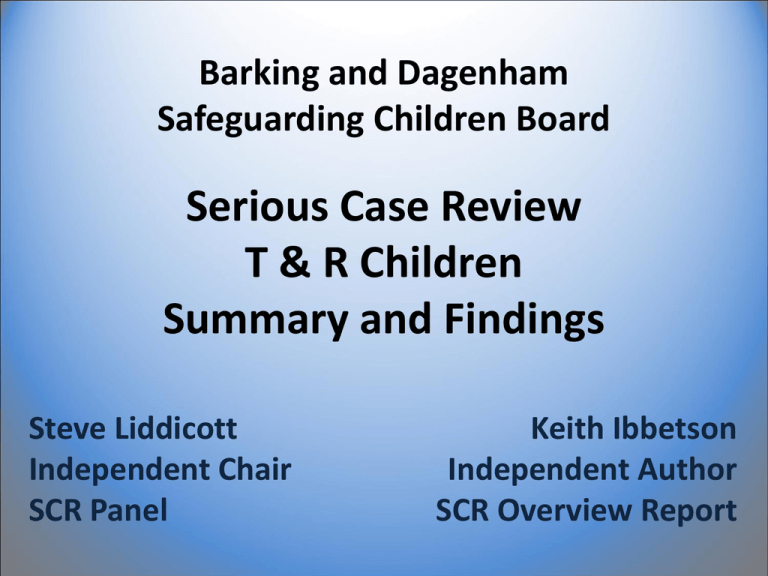
Barking and Dagenham Safeguarding Children Board Serious Case Review T & R Children Summary and Findings Steve Liddicott Independent Chair SCR Panel Keith Ibbetson Independent Author SCR Overview Report Introduction • Reasons for and purpose of a Serious Case Review – Roles of the SCR Panel, the LSCB and the Evaluation Process • Reasons for this Case Review – Factors Underpinning the Review • Process of Review – Terms of Reference – SCR Panel and Contributions to the Review (IMRs) • Case Review – Family – Significant Issues and Events – Key Findings • Contribution of Family Members Reasons for a Serious Case Review • When a child dies and abuse or neglect is known or suspected to be a factor in the death, the LSCB should always conduct a SCR into the involvement of organisations and professionals in the lives of the child and family. • These SCRs should include situations where a child has been killed by a parent, carer or close relative with a mental illness, known to misuse substances or to perpetrate domestic abuse. Working Together, Chapter 8 Purpose of a Serious Case Review The purpose of a Serious Case Review is to: • establish what lessons are to be learned from the case about the way in which local professionals and organisations work individually and together to safeguard and promote the welfare of children; • identify clearly what those lessons are both within and between agencies, how and within what timescales they will be acted on, and what is expected to change as a result; and • improve intra- and inter-agency working and better safeguard and promote the welfare of children. Working Together Chapter 8 Role of the SCR Panel Actively manages the SCR process • Contributions to the Review – IMRs, Chronology etc • • • • Overview Report Executive Summary Action Plan Distribution of Overview Report and Executive Summary • Arrangements for feedback / debriefing to family members Role of the LSCB • SCR Panel should quality assure the final SCR – IMR reports, chronology, overview report, executive summary and action plan(s). • The LSCB should approve the final SCR and: – – – – – Provide an anonymised copy of the SCR to Ofsted etc Arrange feedback / debriefing to staff / media Disseminate the executive summary and key findings Publish the SCR executive summary Implement those actions for which the LSCB has lead responsibility and monitor the timely implementation of the SCR action plan – Act upon receipt of the Ofsted evaluation letter Ofsted Evaluation • Evaluation is about the process of the review as much as it is about the content and analysis: • Panel Membership, Independence, Time Scales, Components of the Review undertaken according to Regulation, Guidance and Evaluation Criteria • Considers each of the components of the review, providing the following evaluations: • • • • • • • • Overall Evaluation Terms of Reference Chronology Individual Management Reviews Overview Report Recommendations Action Plan Executive Summary • Evaluation can be inadequate, adequate, good or outstanding Reasons for this Case Review • Child T was a 12 year old boy, with an autistic spectrum disorder. He lived with his mother and 10 year old brother, R. • On the evening of the 9th February 2010, T’s mother called emergency services sating that she had killed her child and was going to do the same to herself. • Emergency services were unable to revive T who was pronounced dead at 11:30pm that night. • A post mortem took place on 10 February 2010; the preliminary finding was that T’s death was consistent with the ingestion of a caustic fluid – bleach. • The family had been in contact with a wide range of statutory services from the time of T’s birth. At the time of T’s death , both boys were subject to child protections plans under the category of neglect and notification had been provided that care proceedings were to be commenced. Trial / Inquest • Mother has been charged with murder – Pleaded guilty to manslaughter on the grounds of diminished responsibility – Following completion of psychiatric reports, sentenced to interim hospital order for the preparation of further reports – Will be sentenced in February 2011 • Coroner decided not to hold an inquest Factors Underpinning the Review • The SCR covers a period of 12 years; • It deals with the work of over a hundred professionals in more than 20 departments, services and agencies. • Some of the findings may reflect the work in the case overall but may not apply to all of the professionals involved. • There are significant shortcomings in the provision made in this case but there are also some examples of good practice and professionals who have worked diligently and conscientiously. Serious Case Reviews - Process • Decision to hold a case review – February 2010 • SCR Panel & Membership – March 2010 • Target for Completion – August 2010 • Extension to SCR Timetable Agreed in July 2010 • SCR Documentation • • • • • Integrated Chronology (1,782 pages) Individual Management Reviews (17) - finalised Overview Report – final draft agreed by SCR Panel 14th Jan 2011 Action Plan – draft presented to LSCB Executive Summary – draft presented to LSCB • Interim Report to LSCB – November 2010 • Final Report to LSCB – January 2011 • Submission to Ofsted and Evaluation – Jan / April 2011 Terms of Reference • • • • • • • • • • • Quality of interagency working and its impact Identification and management of risk Age, ethnicity, religion, diversity and equalities issues Impact of disabilities / vulnerabilities Impact of domestic violence Impact of substance abuse / misuse Impact of the family members’ immigration status Impact of anti social behaviour on the family Parental mental health Impact of legal planning and proceedings Agency responses to complaints SCR Contributions (Agencies) 1 • London Borough of Barking and Dagenham – – – – Safeguarding and Children’s Rights Service (social care) Legal Services Education Services (including schools) Other council services (including housing, anti-social behaviour team and corporate complaints) • Barking, Havering & Redbridge University Hospitals NHS Trust • London Borough of Ealing – Children’s social care service • NHS Barking and Dagenham – Health overview report for all commissioners of health services • NHS Ealing – Health visiting and antenatal provision up to 1999 • London Ambulance Service • London Probation Trust • Metropolitan Police Service SCR Contributions (Agencies) 2 • North East London (NHS) Foundation Trust (NELFT) – – – – Health Visiting School Nursing Community Paediatric Services Adult Mental Health Services • NHS Direct • North West London Hospitals NHS Foundation Trust • Redbridge Children’s Trust (LB Redbridge and Redbridge NHS) – – – – Education Services (including schools) Health Visiting School Nursing Children’s social care service* • UK Borders Agency* • A local Gudwara (Sikh Temple)* • Parents of Autistic Children Together (a voluntary organisation)* SCR Panel Membership • London Borough of Barking and Dagenham • B&DSCB • Barking, Havering and Redbridge University Hospitals NHS Trust • Ealing LSCB • NHS Ealing • London Probation Trust • Metropolitan Police Service • North East London (NHS) Foundation Trust (NELFT) • Redbridge Children’s Trust (LB Redbridge and Redbridge NHS) • NHS Barking and Dagenham Individual Management Reviews An IMR must cover the following areas: • What was our involvement with this child and family? – Chronology • Analysis of involvement • What can we learn from this case? • Recommendations for action The IMR must also be constructed according to the Evaluation Criteria • Format, repetition, sign off Completion of the IMRs in this SCR • • • • • • • 17 IMRs completed Use of Independent IMR Authors Access to Records Time Scales Evaluation Against the Ofsted Criteria Evaluation Against the Case Review Signing off the IMRs The Family ? Relationship ? Mother Born 1965 R Son - Born 1999 Father Born 1966 T Son - Born 1998 Died 2010 Significant Issues • Parents known to police and social care since 1998 – But virtually no background information in agency files • Domestic Abuse / Anti-Social Behaviour – From 1996 onwards, including criminal prosecutions • Complaints / Cultural Issues – Impact on professionals and failure to understand cultural issues • Health and Disability – Lack of specialist input or routine monitoring • Education – SEN, school places, attendance and “educated at home” • Child Protection Services – Children Subject to Protection Plans for over half of their lives • Legal Advice – Quality and impact Significant Events 1 • Ealing – 1998 to 1999 – Birth of the children – Domestic Abuse – Child T made subject to a Protection Plan • Redbridge – 1999 – Children subject to Protection Plans – Domestic Abuse – Disputes with neighbours Significant Events 2 • Barking and Dagenham 1999 to 2002 – Referral to Child Development Team – Children subject to Protection Plans (father left) • Mother failed to cooperate with protection plans – Initial attempt to get Child T into school – Attendances at A&E – Private paediatric assessment – Legal Advice sought – Children removed from Protection Plans Significant Events 3 • Barking and Dagenham - 2003 to 2007 – Children in Need / Case Closed (2004) – School Attendance – Anti-Social Behaviour – Children taken to see their father – Case conference in April 2006 Significant Events 4 • Barking and Dagenham - 2007 to 2008 – Child T attended school for final time (2007) after which he was “educated at home” – Child R not attending regularly – Children made subject to protection plans – Mother refused to cooperate – Legal Planning meeting – Children removed from Protection Plans Significant Events 5 • Barking and Dagenham – 2008 to March 2009 – Child T’s education – CiN Plan similar to Protection Plan – Father returned to the UK / Domestic Abuse • Barking and Dagenham - 2009 to February 2010 – – – – – – – Children’s education Children subject to Protection Plans Referral to Child Development Team Mental Health Assessment Allegations of sexual abuse and rape Legal Planning Meetings / Letter before Proceedings Death of Child T Key Findings 1 • Predictability / Preventability – Children suffered significant harm through many phases of their lives – There were missed opportunities to intervene – The death of Child T could not have been predicted – However – The death of Child T could have been prevented Key Findings 2 • Assessment of Family Background – Failure to seek background information about the parents, their circumstances and extended family – This compromised the understanding of the family circumstances Assessment of Family Background • Recommendations in Social Care IMR • Overview Recommendations Recommendation 1 All member agencies of Barking and Dagenham LSCB should ensure that their staff carry out and contribute to dynamic assessments of parenting capacity in which the fullest possible knowledge of parental history informs assessment of parenting along with observation of current behaviour. Supervision, training and quality assurance activities should reflect this as a priority. Recommendation 2 When safeguarding concerns have been identified professionals carrying out and contributing to core assessments should seek out information from members of the extended family when they believe that this will assist in safeguarding a child. BDSCB should issue a practice guidance note on this. Child protection conference chairs should always consider how extended family members can contribute to the assessment and protection of children. Key Findings 3 • The overall character of professional contact with the mother – including the impact of complaints made by the mother and the response of agencies to them – Personality and Mental Health – Aggressive Behaviour and Complaints – Impact of her behaviour – Failure to focus on the children Professional Contact With Mother • Recommendations in IMRs • Overview Recommendations Recommendation 7 All member agencies of the LSCB should ensure that they have mechanisms in place whereby information about the number and nature of complaints made by an individual can be shared with staff in other member agencies of the LSCB for the purpose of protecting children. Recommendation 8 Barking and Dagenham LSCB should develop a mechanism that allows the use of complaints by parents or others in child protection cases to be monitored so that any implications for the protection of a child can be more easily recognised. Key Findings 4 • The response of professionals to concerns about the mental health of the mother – Longstanding concerns of professionals – Mother’s refusal to accept an assessment – Impact on parenting – Could have been ordered in legal proceedings – Need for staff to have access to advice / consultation Mental Health Of The Mother • Recommendations in IMRs • Overview Recommendations Recommendation 9 North East London Foundation Trust should consider how it can make a range of advisory and consultation services available to its own staff and to staff in other agencies with safeguarding responsibilities in order to increase their knowledge and understanding of parental mental health problems and their impact on children, including personality disorder and other less widely understood mental disorders. Recommendation 11 Barking and Dagenham Council Safeguarding and Rights and NELFT should develop a programme of briefings and training to ensure that all key staff with decision making responsibilities in relation to child protection have a good understanding of the characteristic presentation of personality disorder and its implications for parenting and are able to integrate this knowledge in their child protection decision making. Recommendation 10 The BDSCB should undertake an investigative audit of children subject to child protection plans and initial child protection conferences in order to understand how currently staff dealing with such cases access advice and expertise about the impact of parental mental health problems. The audit should make recommendations to the LSCB on further action required. Key Findings 5 • The nature of professional dealings with the father – Failure to engage with the father – Lack of consideration of his role in the family other than as a perpetrator of domestic abuse • Recommendations in IMRs Key Findings 6 • Direct professional contact with the children, including attempts to establish their wishes and feelings and respond to their specific needs – Children seldom seen alone – Impact of Child T’s disability Professional Contact With The Children • Recommendations in IMRs • Overview Recommendations Recommendation 12 The LSCB should issue practice guidance to ensure that every core group meeting should have direct work with the child(ren) and observation of the child(ren) as a standing item on its agenda. Schools, nurseries and other bodies that are in direct regular contact with a child should be asked to prepare a report on any relevant communication with the child so that it can be incorporated in the continuing assessment. If access to children and the ability to communicate with them is being impaired or obstructed this should be discussed in the core group and reported back to the social worker’s supervisor who should be expected to agree specific proposals as to how this will be addressed and to monitor their effectiveness. Key Findings 7 • The role played by ethnicity, religion and immigration in the case and professional responses to these issues – Asylum Issues / Reaction of the mother’s extended family to the parents’ marriage / Impact on domestic abuse / Cultural factors may have heightened the mother’s mistrust of services – Professionals seldom considered these issues – Mother used as “explanations” for why she would not cooperate Ethnicity, Religion And Immigration • Recommendations in IMRs • Overview Recommendations Recommendation 3 The London Safeguarding Children Board and the UK Borders Agency should establish a simple mechanism whereby accurate information about the immigration status of a child or a parent can be made available to the local authority where it is required to inform a child protection risk assessment. Details of the agreement should be circulated to all local authorities in London and the London Child Protection Procedures should be revised to integrate this when appropriate. Recommendation 13 The LSCB and the Inter Faith Forum should work jointly to establish a network of faith-based community organisations who are linked to parenting and social work support networks and have received safeguarding training and can ensure that services are accessible to families in the Asian community and particularly to women who are experiencing difficulties in parenting as a result of domestic violence or mental health problems. Key Findings 8 • The role of domestic abuse in the case and the response of professionals – Impact on children and risk underestimated – Whilst processes have improved (1998 to 2009), mother’s failure to prioritise the needs of the children not recognised Domestic Abuse • Recommendations in IMRs • Overview Recommendations Recommendation 4 Barking and Dagenham’s Domestic Violence Coordinator should review the approach to the training of staff over domestic abuse so as to ensure that it emphasises both the need to support victims of domestic abuse but also underlines the need to evaluate the risks posed to children by perpetrators of abuse and by non-abusive parents whose capacity to protect their children is compromised for any reason. Keys Findings 9 • The education of the children, the response of agencies to the children’s SEN, poor school attendance and the decision of the mother to educate Child T at home – Engagement of schools and other education professionals in the child protection process. – Understanding of the education processes by other professionals – Identification of school places – School attendance – Special educational needs (SEN) provision – The ‘home education’ of Child T Education • Recommendations in IMRs • Overview Recommendations Recommendation 14 Barking and Dagenham Council should review its strategy for the provision of training to staff dealing with Special Educational Needs so as to ensure that all such staff are sufficiently aware of the framework for safeguarding children and areas in which it might interface with the code of practice for SEN. Staff with responsibilities for SEN should be able to contribute fully to assessment of risk and actions Recommendation 15 Barking and Dagenham Council should provide training and briefing to ensure that social care managers, child protection conference chairs and independent reviewing officers have a good understanding of the SEN code of practice and its implementation in the borough so that they can ensure that educational issues are fully addressed in child protection conferences and looked after children’s reviews and that the interface between SEN and safeguarding is always properly addressed. Joint training and briefing of staff should be undertaken. Education (continued) Recommendation 16 The Director of Children’s Services should bring the findings of the SCR to the attention of the Association of Directors of Children’s Services and seek its involvement in persuading the Secretary of State for Education to implement the findings and recommendations of the Badman review into the education of children otherwise than at school. Recommendation 17 The Chair of the LSCB and the Director of Children’s Services should bring the findings of the SCR to the attention of the Secretary of State for Education as further evidence to support the need for the implementation of the findings and recommendations of the Badman review into the education of children otherwise than at school. Recommendation 18 The Director of Children’s Services should ensure that staff in the safeguarding and rights service of the local authority are sufficiently conversant with the framework for the education of children otherwise than at school to appreciate that it cannot be relied on to safeguard the welfare of vulnerable children and ensure that their education is being monitored and that in case of ‘home education’ that give cause for concern the need for action under safeguarding legislation should always be considered. Education (continued) Recommendation 19 The Director of Children’s Services should ensure that once completed the council’s revised procedures for the monitoring of children educated otherwise than at school are brought to the attention of managers and staff in the safeguarding and rights service. Recommendation 20 The chairs of LSCBs in Barking and Dagenham and Redbridge should write to all schools in their borough setting out the expectations of the LSCB in relation to the basic steps required in relation to any child who is admitted to a school who is known to be the subject of a child protection plan, including what is expected of the school and what the school should expect from children’s social care services. Key Findings 10 • The impact of substance misuse – Father reported to have drunk heavily in the early period but this does not appear to have been discussed with him – Was not a feature of the recent history • Recommendations in IMRs • No Overview Recommendations Key Findings 11 • The response of agencies to anti-social behaviour, conflict between the mother and her neighbours and other members of the community – Mother’s aggressive behaviour to neighbours, others in the community, parents at schools and professionals – Failure to take into account safeguarding issues Anti-social Behaviour • Recommendations in IMRs • Overview Recommendations Recommendation 21 On completion of the SCR the Chair of LSCB should submit a copy of the overview report in confidence to the chair of the borough Crime and Disorder Partnership. The partnership should consider whether there is any further learning from the SCR in relation to local strategies to combat anti-social behaviour and provide a written account of the outcome of its discussions to the LSCB chair. Key Findings 12 • The role of legal planning in the case – including legal advice given on the threshold for care proceedings • Focus on grounds for removal of the children rather than their welfare (2002 to 2009) – Information provided to legal planning meetings; – The evaluation of risk; – Decision making; – Recording of the actions agreed at legal planning meetings; – Monitoring the completion of actions arising out of legal planning meetings. Legal Planning • Recommendations in IMRs • Overview Recommendations Recommendation 6 Barking and Dagenham Council Safeguarding and Rights Service and the council’s legal practice should jointly review the training and guidance given to staff on the Public Law Outline to ensure that it takes full account of the findings of this SCR and any lessons learnt from it. Recommendation 7 Barking and Dagenham Council should ensure that social work professionals, managers responsible for decision making in complex child protection cases, the council’s legal advisors and staff in child protection advisory roles have a shared sound framework within which to make decisions about the following: - The level of risk to children - The management of decisions to remove them from their parents - The potential impact of parental flight and the tendency of families who fear the removal of their children to withdraw from all professional contact (or ‘closure’) when dealing with children who are believed to be at a high level of risk. - The implementation of the framework should be monitored so that it can be reviewed and improved in the light of practice experience. Key Findings 12 - Continued Recommendations 22 Barking and Dagenham Council legal services and social care services should undertake a joint review of the format for the recording of decisions and outcomes of legal planning meetings so as to ensure that the record of such meetings includes a comprehensive account of all matters falling within their remit including: the evidence of significant harm obtained so far across all dimensions of a child’s life steps that need to be taken to gather more evidence of harm or improve the quality of the evidence the legal duties of the local authority relevant to the circumstances the range of legal powers that are available to the local authority and the range of orders that a court might make the criteria that the court will apply in considering whether to grant any of the range of orders the likelihood that an application will be successful and any tactical considerations in preparing evidence how best to present the evidence that is required by the court taking into account the range of information that is available the steps that should be taken if any one party disagrees with the outcome of the legal planning meeting the steps that will be taken by the safeguarding and rights service in the event that the accepted legal advice is that there are no grounds for proceedings how the outcome of the legal planning meeting will be reported to other agencies and professionals involved Key Findings 12 - Continued Recommendation 23 Barking and Dagenham Council should ensure that policy and practice in relation to all aspects of the conduct of legal planning meetings takes full account of the contribution that all agencies in the multi-agency professional network can make. In particular agencies and professionals outside of the local authority should be informed of the outcome of legal planning meetings in a timely way and given an opportunity to comment on the outcomes and the actions proposed. Key Findings 13 • The role of supervision and the role of more senior managers in the case – Role of good quality supervision in dealing with complex cases – No evidence of supervision or consultation with senior managers in some agencies, weaknesses in others. – Inconsistent, incoherent and inadequate supervision in social care Supervision and Management • Recommendations in IMRs • Overview Recommendations Recommendation 24 The Director of Children’s Services and the Director of Adult Services of Barking and Dagenham Council should ensure that each service within the council that has contact with vulnerable children and adults has a designated safeguarding lead or ‘champion’ who has responsibility for ensuring that staff in the service have policies, procedures and training that are fit for purpose and enable staff to identify vulnerable children and adults, refer them to the appropriate body and participate in measures to safeguard such vulnerable individuals. Recommendation 25 Every professional or member of staff working with children should know how to access supervision and advice in relation to the safeguarding of children. As part of their responsibility under section 11 Children Act 2004 to monitor the performance of member agencies the LSCBs in Barking and Dagenham, Ealing and Redbridge should undertake an audit of the effectiveness of arrangements for supervision and consultation with senior members of staff in relation to children’s safeguarding. Member agencies and the LSCBs should take whatever steps are necessary in order to address gaps in arrangements identified. Supervision and Management Recommendation 26 Barking and Dagenham Council should introduce robust arrangements to ensure that all staff in the safeguarding and rights service receive supervision at the levels required by the council’s policies and that there are mechanisms to ensure that supervision continues to be provided when managers are absent for whatever reason. Group managers are held accountable for ensuring the provision of supervision to all staff in their services and should put in place effective arrangements for monitoring compliance. Recommendation 27 The Safeguarding and Rights Service of Barking and Dagenham Council should undertake a review of the quality and effectiveness of supervision across all teams dealing with safeguarding cases so as to ensure that the approach taken reflects the full range of professional responsibilities of the service and not just procedural requirements. Recommendation 28 The Safeguarding and Rights Service of Barking and Dagenham Council should ensure that Professional Development and Appraisal systems provide the monitoring and support necessary to enable team managers and deputy team managers to learn openly from errors and mistakes and to challenge the views of others (including more senior managers) over the management of cases in an open and accountable way in which the interests of the child are always the paramount consideration. Supervision and Management Recommendation 29 Barking and Dagenham Council should review the performance of all of the staff and managers in the service for children with disabilities who were involved in this case. Recommendation 30 The service lead with responsibility for audit and quality assurance in the Safeguarding and Rights Service should review arrangements for case audit and feedback in the light of the findings of this SCR. There needs to be clarity about the focus of audit (i.e. whether it is on compliance with procedures or on the quality of work). Particular consideration should be given to ensuring that there is clear accountability for implementing the recommendations of audit exercises by a senior operational manager and a review of the implementation of such recommendations after an agreed period. Recommendation 31 Barking and Dagenham should undertake an audit of its conference chairing in a sample of cases in order to establish how effectively conference chairs are chairing conferences in complex cases and implementing their wider quality assurance role. Any action necessary should be taken arising from the findings of the audit. Key Findings 14 • The overall effectiveness of interagency working – Procedurally, interagency working effective – But the quality and impact were poor • Recommendations in IMRs Key Findings 15 • The specific contribution of health professionals • Information held by GPs and Paediatricians not shared and they failed to focus on safeguarding issues • Failure to contribute to protection of the children • Recommendations in IMRs Key Findings 16 • Disagreement and dissent between professionals – Professionals recognised the lack of progress but generally “suffered in silence” • Recommendations in IMRs • Recommendation in Overview Report Recommendation 32 The LSCBs in Barking and Dagenham and in Redbridge should ensure that staff in all agencies are familiar with the sections in the London child protection procedures dealing with professional disagreement and dissent and that they are able to make use of them, if necessary seeking support from a more experienced manager or professional advisor in their agency or service who can assist in escalating concerns to the attention of more senior staff. Key Findings 17 • Lessons in relation to the safeguarding of a child with a disability – Disabled children are more vulnerable to abuse – Dependent on his mother who refused professional interventions – He did not receive ongoing monitoring of his condition – Once educated at home, he became even more isolated • Recommendations in IMRs Contribution of Family Members • • • • Surviving Child Father Mother Extended Family Discussion of the Overview Report 1. Arrangements for the Serious Case Review 2. Details of family members and family background 3. Chronological account and evaluation of the services provided 4. Thematic evaluation of the services provided – See next slide Discussion of the Overview Report 1. The overall character of professional contact with the mother – including the impact of complaints made by the mother and the response of agencies to them 2. How professionals responded to concerns about the mental health of the mother 3. The nature of professional dealings with the father 4. Direct professional contact with the children, including attempts to establish their wishes and feelings and respond to their specific needs 5. The role played by ethnicity, religion and immigration in the case and professional responses to these issues 6. The role of domestic abuse in the case and the response of professionals Discussion of the Overview Report 7. The education of the children, the response of agencies to the children’s SEN, poor school attendance and the decision of the mother to educate Child T at home 8. The impact of substance misuse 9. The response of agencies to conflict between the mother and her neighbours and other members of the community 10. The role of legal planning in the case – including legal advice given on the threshold for care proceedings 11. The role of supervision and the role of more senior managers in the case 12. The overall effectiveness of interagency working 13. Lessons in relation to the safeguarding of a child with a disability Discussion of the Overview Report 5 Additional recommendations of the Serious Case Review panel • Appendices 1. Terms of reference of SCR – cross referenced to the findings of the SCR overview report 2. Membership of the SCR panel 3. Summary of relevant organisational changes in the NHS in East London 2000 - 2010 4. Full list of agency reports commissioned, received and reviewed with dates of submission 5. Background documents and references
